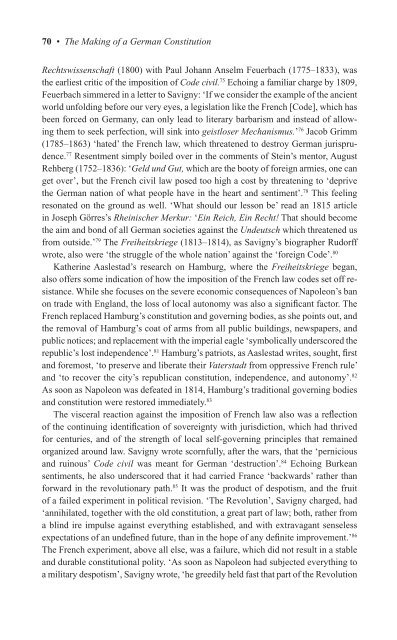Making of a German Constitution : a Slow Revolution
Making of a German Constitution : a Slow Revolution
Making of a German Constitution : a Slow Revolution
Create successful ePaper yourself
Turn your PDF publications into a flip-book with our unique Google optimized e-Paper software.
70 • The <strong>Making</strong> <strong>of</strong> a <strong>German</strong> <strong>Constitution</strong>Rechtswissenschaft (1800) with Paul Johann Anselm Feuerbach (1775–1833), wasthe earliest critic <strong>of</strong> the imposition <strong>of</strong> Code civil. 75 Echoing a familiar charge by 1809,Feuerbach simmered in a letter to Savigny: ‘If we consider the example <strong>of</strong> the ancientworld unfolding before our very eyes, a legislation like the French [Code], which hasbeen forced on <strong>German</strong>y, can only lead to literary barbarism and instead <strong>of</strong> allowingthem to seek perfection, will sink into geistloser Mechanismus.’ 76 Jacob Grimm(1785–1863) ‘hated’ the French law, which threatened to destroy <strong>German</strong> jurisprudence.77 Resentment simply boiled over in the comments <strong>of</strong> Stein’s mentor, AugustRehberg (1752–1836): ‘Geld und Gut, which are the booty <strong>of</strong> foreign armies, one canget over’, but the French civil law posed too high a cost by threatening to ‘deprivethe <strong>German</strong> nation <strong>of</strong> what people have in the heart and sentiment’. 78 This feelingresonated on the ground as well. ‘What should our lesson be’ read an 1815 articlein Joseph Görres’s Rheinischer Merkur: ‘Ein Reich, Ein Recht! That should becomethe aim and bond <strong>of</strong> all <strong>German</strong> societies against the Undeutsch which threatened usfrom outside.’ 79 The Freiheitskriege (1813–1814), as Savigny’s biographer Rudorffwrote, also were ‘the struggle <strong>of</strong> the whole nation’ against the ‘foreign Code’. 80Katherine Aaslestad’s research on Hamburg, where the Freiheitskriege began,also <strong>of</strong>fers some indication <strong>of</strong> how the imposition <strong>of</strong> the French law codes set <strong>of</strong>f resistance.While she focuses on the severe economic consequences <strong>of</strong> Napoleon’s banon trade with England, the loss <strong>of</strong> local autonomy was also a significant factor. TheFrench replaced Hamburg’s constitution and governing bodies, as she points out, andthe removal <strong>of</strong> Hamburg’s coat <strong>of</strong> arms from all public buildings, newspapers, andpublic notices; and replacement with the imperial eagle ‘symbolically underscored therepublic’s lost independence’. 81 Hamburg’s patriots, as Aaslestad writes, sought, firstand foremost, ‘to preserve and liberate their Vaterstadt from oppressive French rule’and ‘to recover the city’s republican constitution, independence, and autonomy’. 82As soon as Napoleon was defeated in 1814, Hamburg’s traditional governing bodiesand constitution were restored immediately. 83The visceral reaction against the imposition <strong>of</strong> French law also was a reflection<strong>of</strong> the continuing identification <strong>of</strong> sovereignty with jurisdiction, which had thrivedfor centuries, and <strong>of</strong> the strength <strong>of</strong> local self-governing principles that remainedorganized around law. Savigny wrote scornfully, after the wars, that the ‘perniciousand ruinous’ Code civil was meant for <strong>German</strong> ‘destruction’. 84 Echoing Burkeansentiments, he also underscored that it had carried France ‘backwards’ rather thanforward in the revolutionary path. 85 It was the product <strong>of</strong> despotism, and the fruit<strong>of</strong> a failed experiment in political revision. ‘The <strong>Revolution</strong>’, Savigny charged, had‘annihilated, together with the old constitution, a great part <strong>of</strong> law; both, rather froma blind ire impulse against everything established, and with extravagant senselessexpectations <strong>of</strong> an undefined future, than in the hope <strong>of</strong> any definite improvement.’ 86The French experiment, above all else, was a failure, which did not result in a stableand durable constitutional polity. ‘As soon as Napoleon had subjected everything toa military despotism’, Savigny wrote, ‘he greedily held fast that part <strong>of</strong> the <strong>Revolution</strong>




